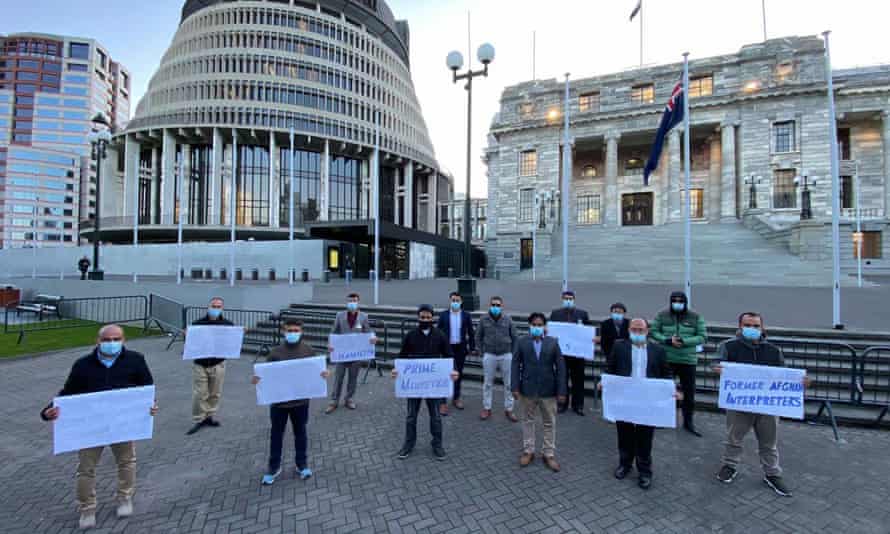A group of former Afghan interpreters are frustrated and disappointed their requests to New Zealand’s government to resettle their family members, who are at risk from the Taliban, are going unanswered.
About 20 members from the Afghan Veteran Interpreters Association gathered outside parliament for the second day in a row on Tuesday, in a desperate attempt to speak to the prime minister, Jacinda Ardern, or immigration minister Kris Faafoi about their plight.
The translators felt forced to travel from Hamilton to Wellington after their letters, emails and phone calls to the ministers went unanswered. Despite standing on parliament grounds for 10 hours on Monday, no ministers came to speak to them.
New Zealand left behind about 400 people in Afghanistan, including 43 families, who worked for the New Zealand Defence Force and on government projects, including as interpreters, labourers or employees.
The members of the association are made up of translators who worked “shoulder to shoulder” for the defence force and the New Zealand police between 2003-2013, its spokesperson Raza Khadin said. Many members were resettled in New Zealand in 2012. But now some of their siblings, parents and extended families were at grave risk, he said.

“The recent developments in Afghanistan has turned the tables. Where we used to protect the people from the Taliban, they have now become the rulers of Afghanistan. We are the ‘bad guys’ now,” Khadin said.
The Taliban have been going door to door, and some of the former interpreters’ houses have been searched, forcing their extended families to flee, or go into hiding. Khadin said their association with New Zealand meant they had become targets.
“We are citizens of this country, we have served for this country, we have put our lives and our families’ lives on the frontline and at risk to keep other Kiwis safe,” he added.
Another member of the group, who wished to remain anonymous for his and his family’s safety, said he appreciated what New Zealand had done for many Afghans at risk, but unfortunately the former interpreters’ families were not on the list of those who had been granted visas.
“If [other people] have a visa, we don’t have a problem, but we are just here fighting for ours,” he said.
“It’s frustrating. We had big hope yesterday that somebody would come and talk to us.”
On Monday, Ardern said she was unaware the group was outside parliament, but said she had spoken to the former translators earlier in August, just prior to the country being put into a nationwide lockdown.
“We had a conversation about the plights of, in many cases, it’s their extended family that they were looking to support to bring into New Zealand,” she said.
“We know there was more demand than we were able to meet [with the evacuation effort] and the time that we had available, and that’s why we’re working through next steps.”
A spokesman for Faafoi told Stuff the government was “aware” of the interpreters’ request.
“The Minister has written to the group to confirm that discussions around potential next steps are happening with partner countries, including further possible humanitarian contributions,” the spokesman said, in a statement.
“Work on further phases of help is complex, given the uncertainties in Afghanistan, and this will take some time to complete.”








